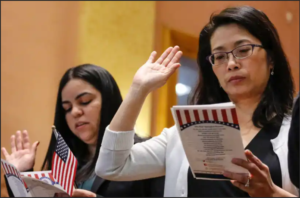by James A. Bacon
The 4th of July, commemorating our nation’s declaration of independence, is an occasion to think about what we appreciate about America. Amidst our social breakdown, culture wars, and vitriolic politics, that’s not an easy thing to do. Among the most demoralizing aspects of our times is the abysmal level of understanding of the source of the precious rights — freedom of religion, freedom of speech, freedom to assemble and petition the government — that we take for granted.
As Joni Albrecht, director of the John Marshall Center for Constitutional History & Civics, observes in the Virginia Mercury, less than half of U.S. adults could name all three branches of government; only one in four U.S. adults could name a single right identified in the First Amendment.
Many of our schools fail to teach the basic knowledge required to be a functioning and contributing citizen. According to Virginia Department of Education data, only 70% of Virginia school children passed their Civics & Econ Standards of Learning exam in the 2021-22 school year. Only one in five scored “advanced.” In other words, 30% are politically illiterate, and another 50% are marginally literate.
It is a sad commentary when the most civically literate residents of Virginia are of Asian origin. Immigrants from across the vast continent of Asia, predominantly first and second generation, score higher than other racial/ethnic groups in their knowledge of the nation’s political and civic institutions than Americans with deep roots in the country.
According to VDOE data, students classified as “Asian” outscore other groups by far: 90% passed their Civics & Econ exam; 42% scored “advanced.” No other group came close. Not even White students, many of whom can trace their ancestry to the founding of the nation.
The disparity speaks to the profound debasement of mainstream American culture and the erosion of the understanding of what it means to be a citizen. As Thomas Jefferson famously said, “An educated citizenry is a vital requisite for our survival as a free people.”
Americans ill-educated in civics will fall prey to misinformation, tribalism, and demagoguery. We can see the results in daily headlines chronicling our descent into moral, social, and political anarchy.
In his book, The Dying Citizen: How Progressive Elites, Tribalism, and Globalization Are Destroying the Idea of America, Victor David Hanson argues that the concept of citizenship, first articulated by the Greeks and Romans, represented one of the great advances of Western Civilization. Across history, a large middle class of economically self-supporting citizens with a stake in the political system represented a stabilizing force for society, buttressing against the self-aggrandizing proclivities of the aristocracy and the violent passions of the poor. He sees American citizenship in decline as elites embrace global governance, large swaths of the population succumb to racial/ethnic tribalism, and public policies undermine traditional perquisites of citizenship. Today foreigners can enter the country illegally and be entitled to free education, free healthcare, and a wide array of government benefits. Astonishingly in some locations, non-citizens are entitled to the right to vote in local elections.
In the Mercury, Albrecht describes a collaboration between the John Marshall Center and the Virginia Museum of History and Culture to “revolutionize” civics education.
“Beyond politics, ideologies, and division, we have a real duty to teach students about America’s ongoing pursuit of all that is promised in the Declaration of Independence and the wending journey to a more perfect union,” she writes. “This transfer of knowledge from one generation to the next must not be taken for granted. It requires purposeful teaching and is crucial to the ongoing health and success of our nation. Fortunately, civics is required in Virginia public schools, but there is great disparity as to how much time is devoted to the topic, how much money is allocated and how much importance it is given in classrooms.”
I am grateful to Albrecht for her efforts. The nation desperately needs what she’s offering. It’s anyone’s guess, however, whether the initiative will succeed in counteracting corrosive ideologies that view the evolution of America’s institutions as an endless procession of oppressions rather than a “wending journey to a more perfect union.”
But when I’m celebrating the 4th of July this evening with my citizen-friends in my neighborhood, I will hoist a glass to Albrecht and wish her well.



